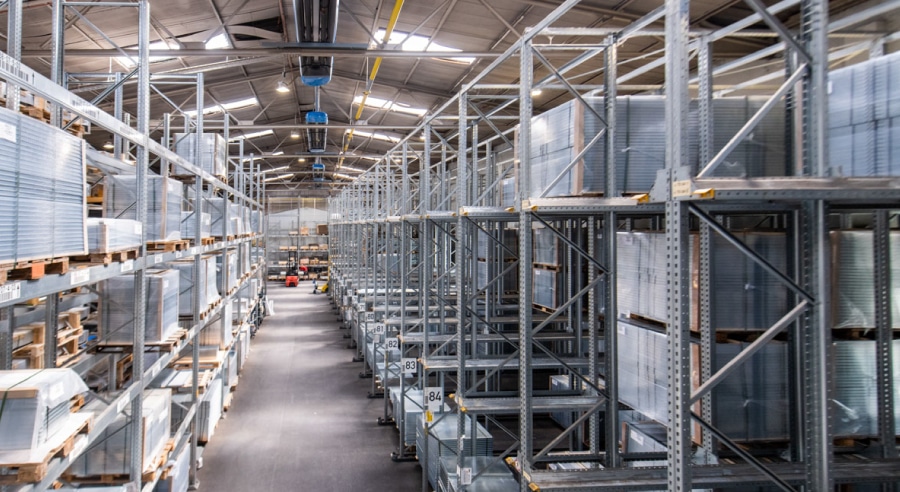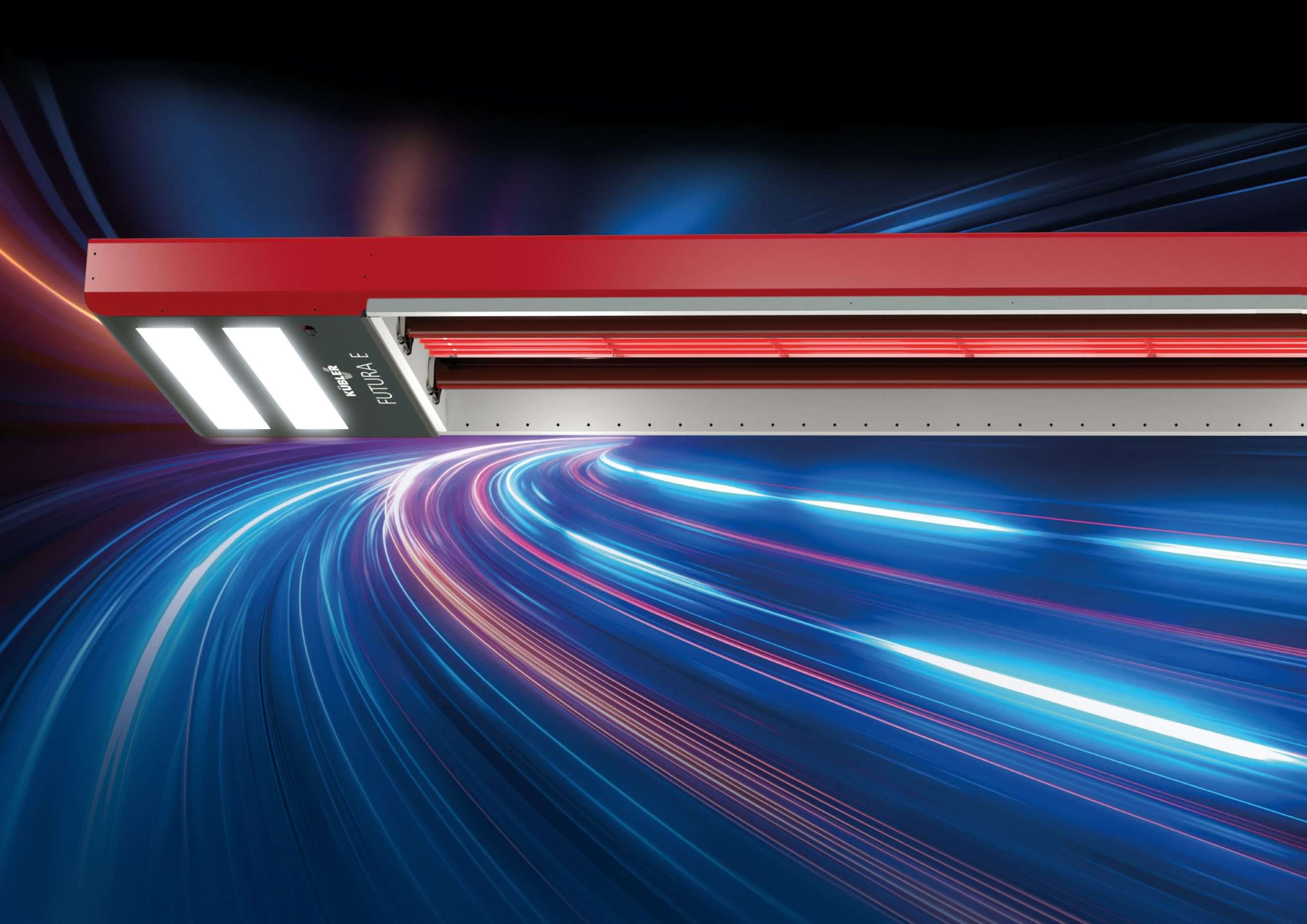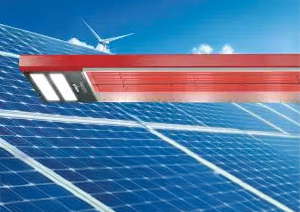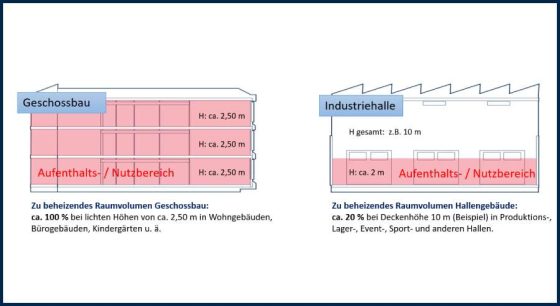Cost factor hall heating - 10 savings tips from the expert

The first piece of good news is that if you have a modern infrared indoor heating system in operation, you will save a lot of energy right from the start - regardless of the year of manufacture. Current models, when smartly controlled, are even more economical and can be operated with renewable energies, so replacing them can be economical, but you are basically on the right side.
The second piece of good news is that energy consumption can be reduced even further if you make the most of the potential of your energy-saving hall heating system. Because, as hall heating expert Thomas Kübler says: "The most economical heating system is the one that is not running." As your infrared heating system works quickly, the temperature in the building can be lowered when no work is being carried out and work areas can be heated up again quickly when required. We would like to give you some important tips on this:
Tip 1: Reduce the heating times to what is really necessary.
Infrared heaters only require short heating-up times and can be switched on or off as required. You should therefore take advantage of the possibilities offered by modern digital controls. Check the time setting of your control system and adjust it to the actual working times in your hall. Incidentally, if you are not yet using a modern control system, you can retrofit this relatively easily in your existing system.
Tip 2: Check the heating zones for demand-oriented settings.
Not everyone works the same amount of time in every work area. Switch off the zones where the shift ends earlier or where no work is done on certain days.
Tip 3: Reduce the set temperature by 2 to 3 degrees.
In this way, you benefit from the special advantage of infrared heating, which ensures earlier comfort thanks to its heat radiation and the heated surfaces, e.g. the hall floor (bidirectional mode of operation). This means that the same heating quality of 18 °C air temperature of a warm air heater can be achieved at 15 to 16 °C with a highly efficient infrared hall heater. Take advantage of this benefit!
Tip 4: Check your door opening times.
Reduce these to a necessary minimum. Open doors waste a lot of energy unnecessarily. For frequent door openings, use smart software tools such as TorOff, to avoid energy losses.
Tip 5: Check the room frame for open windows and leaks.
A lot of energy can also be lost through open windows or leaking building envelopes. Unpleasant cold bridges are also created. Check your buildings and make small repairs if necessary. In this way, unnecessary energy losses can be avoided.
Tip 6: Clean the reflectors of older heating appliances.
Clean stainless steel reflectors ensure optimum infrared transmission in the working areas. If soiled, part of the heat radiation is lost through diffusion. Up to 10 percent on heavily soiled surfaces! This unnecessary consumption can be saved simply and effectively. Note: with modern top appliances such as OPTIMA plus, MAXIMA, MAXIMA E-Hybrid or the innovative energy-flexible Fair.AIdH hall heating systems, e.g. the FUTURA there is no need to clean the reflector due to the design.
Tip 7: Think about replacing your old heating system.
Then please don't make the mistake of going back to a convective system for hall heating (i.e. systems that work with warm air or warm water). Why? Because this would very probably be a step backwards in terms of heating energy consumption - not to mention the loss of comfort. If you are thinking about a heat pump, you should know: The heat pump is excellent for producing heat very efficiently at a low temperature level - ideal for most multi-storey buildings. In hall buildings with ceiling heights of over 4 meters, this heating principle often does not work satisfactorily. In addition, you lose the option of heating in line with the actual heat demand, i.e. at the times and in the areas of the hall where heat is actually needed. The system inertia of hydraulic heat pump systems and the heat distribution with additional auxiliary energy required are not very suitable for the dynamic and volatile requirements of industrial and commercial operations. From open gates to shift operation. So if you are thinking about optimizing your heating system due to the age of the system and the overall situation in order to reduce CO2emissions and reduce heating costs, be sure to seek advice from proven experts in energy-efficient hall heating.
Tip 8: Find out about the new GEG-compliant hall heating technologies.
To meet the requirements of climate change, a wide range of options have been developed to specifically reduce energy consumption in halls. Right up to the possibility of using renewable energies very economically with our innovative E-HYBRID or multi-energy systems (Fair.AIdH technologies). The latest cutting-edge technologies are able to absorb different forms of energy and thus beam you into the carbon-free era in terms of heating. These are technologies that are very economical because the investment remains affordable and because consumption can be significantly reduced again thanks to the many newly developed functions. In energy management and controlling, you can be sure that optimizing your heating with the right technology will pay off for you. And for the environment.
Tip 9: Use the possibilities of AI-supported, digital control systems.
An important factor for low-consumption heating operation is the operation of the system. Modern modular control systems such as CELESTRA or MAXTRA offer a wide range of AI-supported options for automatically running your hall heating system on the ideal line and using virtually every opportunity to save energy. Automatic switch-off when the hall doors are open, building storage or the integration of weather data are examples of this. The integration of an energy management system such as EMMA, which was specially developed for hall heating systems and is BAFA-listed, also ensures complete transparency of system operation through real-time analysis of each individual heater, rapid fault detection and also provides the necessary documentation for your quality management, for example in accordance with DIN 50001. By the way, you can find a quick and easy-to-understand source of information in just a few minutes with this Explanatory video.
Tip 10: Seek advice from proven experts!
Heating halls reliably, comfortably and at the same time cost-effectively and in a climate-friendly way is anything but trivial. This is because they place completely different demands on heating technology than residential or office buildings. Make sure you contact experienced experts who are familiar with this special category of building. The hall heating specialist KÜBLER provides a lot of valuable information on www.kuebler-hallenheizungen.de available.
And last but not least, the third piece of good news: if you consistently follow the above recommendations, you can realize valuable savings potential for your company with relatively little effort, make a relevant contribution to climate protection, meet the legal requirements and benefit from a particularly pleasant thermal working climate in your hall building.
-
How is energy used correctly? What does efficiency mean? In the German government's current energy policy, there is a huge gap between aspiration and reality. After all, industrial buildings are not treated as industrial buildings because they only account for two percent of buildings - even though they are responsible for 15 percent of greenhouse gas emissions. The latter has not played a role to date. Behind this two percent are 420,000 to 480,000 hall buildings that are used in industry, commerce and municipalities as production halls, logistics halls, workshops, sports halls or sales outlets. A small number that is responsible for a significant proportion of energy consumption and GHG emissions in Germany.
-
What is probably the most effective lever against the gas crisis, price pressure and dependence on Russia at the moment? The answer: consuming less energy. The German government is of this opinion and is calling for energy savings in a large-scale campaign - supported by industry and associations. This goal can be achieved. When it comes to the large halls of industrial and commercial enterprises, it is even easier and quicker than expected.
-
In 2021, the new CO2-tax came into force. It is intended to help Germany achieve its climate protection targets. Read on to find out what this means for your company in terms of costs and what you should do now!
-
The decision on the Heating Act (Building Energy Act - GEG) has been made, but the questions remain. But there is no need to worry: the legislator has provided for generous transition periods, technological openness and pragmatic, affordable regulations for the gradual move towards climate-neutral heating by 2045. Dr. Jens Findeisen explains what you need to know now when heating commercial and industrial buildings







